Herbaria are museums that hold collections of pressed, labeled plant specimens mounted on sheets of archival papers, generally filed in sealed metal cabinets. Ranging in size from hundreds to millions of specimens, herbaria are cornerstones of research in plant biology and are used in studies of taxonomy, genomics, ecology, conservation, and more. UVM’s Pringle Herbarium has the world’s largest collection of plants collected in Vermont and is the second-largest herbarium in New England. As such, it is a hub of research and curatorial activity, making it an exceptional place for an internship setting.
The herbarium internship provides students with a unique opportunity to develop and complete individual projects that are centered on sets of specimens collected from around the world. This experience provides interns with hands-on experience working in a prominent natural history collection and the opportunity to explore how herbaria function and why they are such valuable resources for botanical research and education.
Six students are participating in the 2025 internship, each of whom is working on an independent, collections-based project. Students work to curate their unique set of specimens and develop their skills in data management, plant identification, and specimen curation. While each project requires a different approach and presents unique challenges, interns work together to solve problems and share finds from each other’s projects.
To be considered for this internship, students must have taken Plant Systematics (PBIO 2090) and are asked to write an essay discussing their interest in herbaria and plant diversity research.
2025 Pringle Herbarium Interns
Gracie Byrd
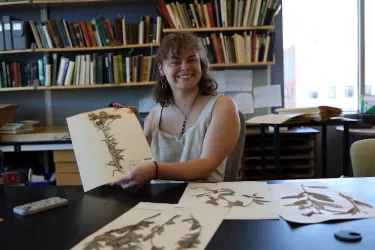
Gracie is a Plant Biology minor. Her internship project focuses on the Pringle Herbarium’s set of specimens collected by German botanist Friedrich Sellow (1789–1831) in Brazil. Sellow was an important early collector of the Brazilian flora, and his specimens are of particular scientific and cultural value. The Pringle Herbarium received this set of specimens from the Berlin Botanical Garden and Botanical Museum in the early 20th century, but they have not been fully incorporated in the herbarium’s databases until now.
Julia Chadderdon
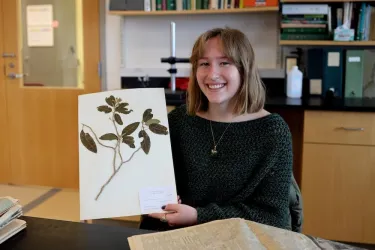
Julia is a Plant Biology major. Her internship project is centered on specimens collected by William Countryman (1920–2005), Vermont horticulturalist, botanist, and former head of Biology at Norwich University. Countryman had strong interest in aquatic plants and collected specimens across Vermont and around the world. His personal herbarium, which numbered some 15,000 specimens, was donated to the Pringle Herbarium after his death in 2005; Julia is working to process several hundred specimens that will be integrated into our collection and others that will be exchanged with other institutions.
Tristan Lynn
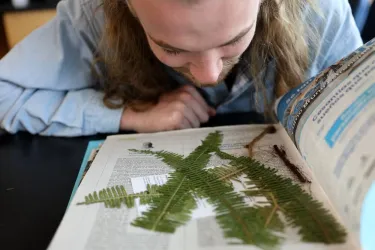
Tristan Lynn is an Environmental Studies major. He is working with identifying and processing specimens of ferns collected in Colombia by Pringle Herbarium Director Weston Testo for his internship project. These specimens, many of which are poorly known or undescribed species, are central to research activities in the Testo Lab, making them of particular importance to the herbarium.
Bryn Macnabb
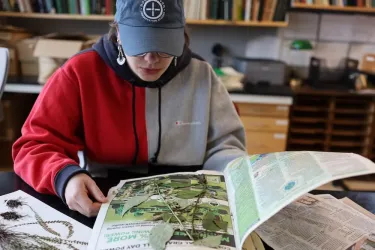
Bryn is a Plant Biology minor. Her internship project focuses on specimens collected by Pringle Herbarium Director Weston Testo, particularly those collected as part of the Spring 2025 travel course Plant Systematics in Costa Rica. Bryn is working to label, mount, and help identify these specimens, many of which are of species new to the Pringle Herbarium.
Eva Morris
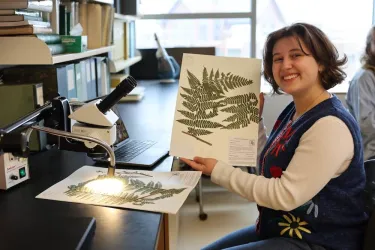
Eva is a Plant Biology major. Like Tristan, Eva is working with specimens collected in Colombia as part of an ongoing research project on the country’s fern flora. The specimens that Eva is working with were collected by collaborators at other institutions in the US and Colombia, so an important part of her project is linking the specimens at the Pringle Herbarium with duplicates deposited in other herbaria.
Victoria Rios
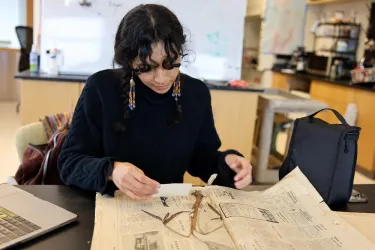
Victoria is a Plant Biology minor. Victoria’s internship project is focused on a set of specimens collected near Manaus, Brazil in the early 1970s by former Lyndon State College biology professor David Conant (1949–2018). Conant was best known as a world expert in tree ferns, but these collections are entirely flowering plants, collected while he was a graduate student. Victoria is working to identify these specimens with the help of databases of Brazilian herbaria that include duplicates of our specimens. These specimens will add valuable representation of plants from the Amazon to the Pringle Herbarium.